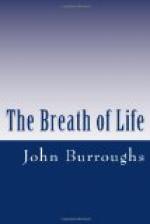The cell is the parent of every living thing on the globe; and if it is unthinkable that the material and irrational forces of inert matter could produce it, then mechanics and chemistry must play second fiddle in all that whirl and dance of the atoms that make up life. And that is all the vitalists claim. The physico-chemical forces do play second fiddle; that inexplicable something that we call vitality dominates and leads them. True it is that a living organism yields to scientific analysis only mechanical and chemical forces—a fact which only limits the range of scientific analysis, and which by no means exhausts the possibilities of the living organism. The properties of matter and the laws of matter are intimately related to life, yea, are inseparable from it, but they are by no means the whole story. Professor Henderson repudiates the idea of any extra-physical influence as being involved in the processes of life, and yet concedes that the very foundation of all living matter, yea, the whole living universe in embryo—the cell—is beyond the possibilities of physics and chemistry alone. Mechanism and chemism are adequate to account for astronomy and geology, and therefore, he thinks, are sufficient to account for biology, without calling in the aid of any Bergsonian life impulse. Still these forces stand impotent before that microscopic world, the cell, the foundation of all life.
Our professor makes the provisional statement, not in obedience to his science, but in obedience to his philosophy, that something more than mechanics and chemistry may have had a hand in shaping the universe, some primordial tendency impressed upon or working in matter “just before mechanism begins to act”—“a necessary and preestablished associate of mechanism.” So that if we start with the universe, with life, and with this tendency, mechanism will do all the rest. But this is not science, of course, because it is not verifiable; it is practically the philosophy of Bergson.




